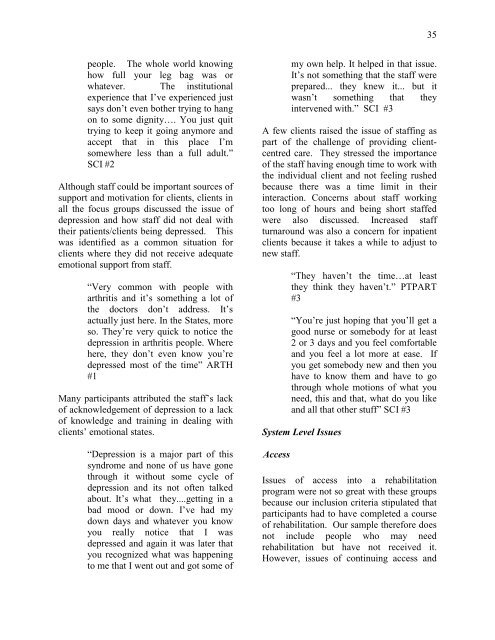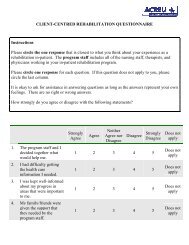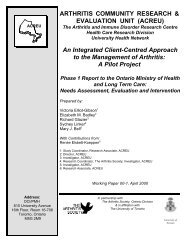Client-Centred Rehabilitation - Arthritis Community Research ...
Client-Centred Rehabilitation - Arthritis Community Research ...
Client-Centred Rehabilitation - Arthritis Community Research ...
Create successful ePaper yourself
Turn your PDF publications into a flip-book with our unique Google optimized e-Paper software.
35<br />
people. The whole world knowing<br />
how full your leg bag was or<br />
whatever. The institutional<br />
experience that I’ve experienced just<br />
says don’t even bother trying to hang<br />
on to some dignity…. You just quit<br />
trying to keep it going anymore and<br />
accept that in this place I’m<br />
somewhere less than a full adult.”<br />
SCI #2<br />
Although staff could be important sources of<br />
support and motivation for clients, clients in<br />
all the focus groups discussed the issue of<br />
depression and how staff did not deal with<br />
their patients/clients being depressed. This<br />
was identified as a common situation for<br />
clients where they did not receive adequate<br />
emotional support from staff.<br />
“Very common with people with<br />
arthritis and it’s something a lot of<br />
the doctors don’t address. It’s<br />
actually just here. In the States, more<br />
so. They’re very quick to notice the<br />
depression in arthritis people. Where<br />
here, they don’t even know you’re<br />
depressed most of the time” ARTH<br />
#1<br />
Many participants attributed the staff’s lack<br />
of acknowledgement of depression to a lack<br />
of knowledge and training in dealing with<br />
clients’ emotional states.<br />
“Depression is a major part of this<br />
syndrome and none of us have gone<br />
through it without some cycle of<br />
depression and its not often talked<br />
about. It’s what they....getting in a<br />
bad mood or down. I’ve had my<br />
down days and whatever you know<br />
you really notice that I was<br />
depressed and again it was later that<br />
you recognized what was happening<br />
to me that I went out and got some of<br />
my own help. It helped in that issue.<br />
It’s not something that the staff were<br />
prepared... they knew it... but it<br />
wasn’t something that they<br />
intervened with.” SCI #3<br />
A few clients raised the issue of staffing as<br />
part of the challenge of providing clientcentred<br />
care. They stressed the importance<br />
of the staff having enough time to work with<br />
the individual client and not feeling rushed<br />
because there was a time limit in their<br />
interaction. Concerns about staff working<br />
too long of hours and being short staffed<br />
were also discussed. Increased staff<br />
turnaround was also a concern for inpatient<br />
clients because it takes a while to adjust to<br />
new staff.<br />
“They haven’t the time…at least<br />
they think they haven’t.” PTPART<br />
#3<br />
“You’re just hoping that you’ll get a<br />
good nurse or somebody for at least<br />
2 or 3 days and you feel comfortable<br />
and you feel a lot more at ease. If<br />
you get somebody new and then you<br />
have to know them and have to go<br />
through whole motions of what you<br />
need, this and that, what do you like<br />
and all that other stuff” SCI #3<br />
System Level Issues<br />
Access<br />
Issues of access into a rehabilitation<br />
program were not so great with these groups<br />
because our inclusion criteria stipulated that<br />
participants had to have completed a course<br />
of rehabilitation. Our sample therefore does<br />
not include people who may need<br />
rehabilitation but have not received it.<br />
However, issues of continuing access and








